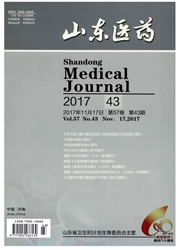

 中文摘要:
中文摘要:
目的:应用液体蛋白芯片飞行时间质谱技术分析21-三体综合征胎儿羊水的蛋白质表达谱,寻找具有潜在诊断意义的羊水标记物,以用于产前快速诊断21-三体综合征。方法:收集12例21-三体综合征和10例正常胎儿孕中期羊水标本,经SPE-C磁珠纯化、基质辅助激光解析电离飞行时间质谱(MALDI-TOF-MS)分析及FlexAnalysis3.0软件分析系统研究其羊水蛋白表达谱。每组样品重复检测3次。结果:质荷比(m/z)为8216.17Da和8935.58Da的蛋白丰度能较好的鉴别21-三体综合征组和正常组。结论:液体蛋白芯片飞行时间质谱技术作为研究蛋白表达谱的工具,具有良好的重复性和精确度,筛选得到的m/z为8216.17Da和8935.58Da的蛋白可能是潜在的21-三体综合征胎儿区别于正常胎儿的羊水标记物。
 英文摘要:
英文摘要:
Objective:To establish proteomic profiling using functional magnetic bead based sample fractionation method combinded with matrix-assisted laser desorption/ionization time of flight mass spectrometry(MALDI-TOF-MS)technology and to seek potential biomarkers of Trisomy 21 syndrome for prenatal diagnosis.Methods: The plasma protein profiling of one group of 12 Trisomy 21 syndrome and one group of 10 normal controls by Autoflex Ⅱ magnetic bead enrichment and MALDI-TOF-MS was analyzed and each group was repeated 3 times.Result:The two peaks with mass charge ratio(m/z)8216.17Da and 8935.58Da optimally discriminated Trisomy 21 syndrome from normal control group.Conclusion: Functional magnetic bead based sample fractional method combined with MALDI-TOF-MS is accurate and stable protein with m/z 8216.17Da and 8935.58Da,which may be potential biomarker to distinguish Trisomy 21 syndrome from normal fetal.
 同期刊论文项目
同期刊论文项目
 同项目期刊论文
同项目期刊论文
 期刊信息
期刊信息
